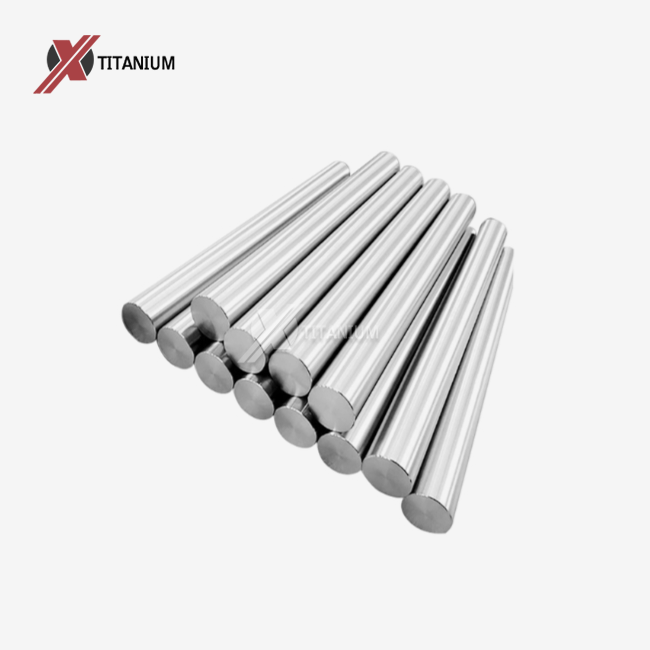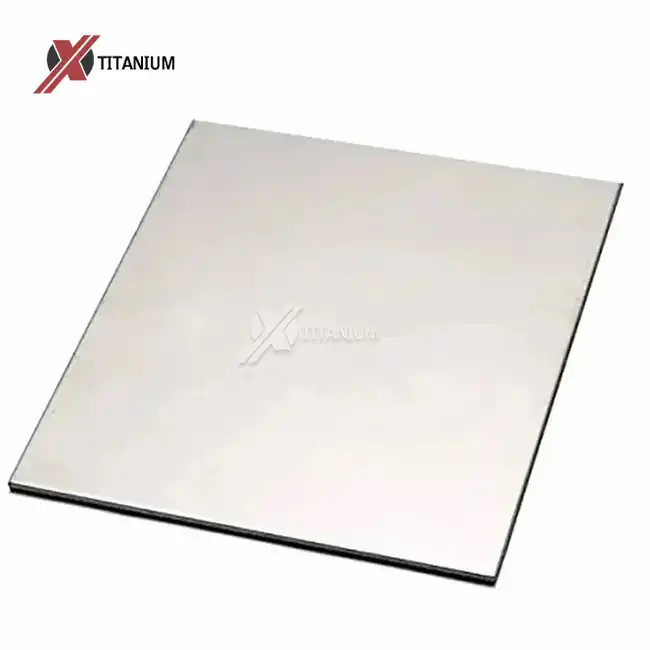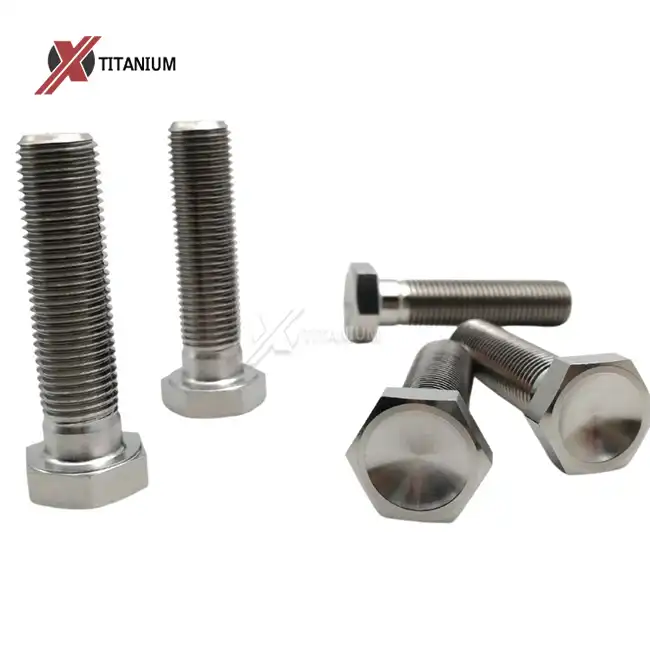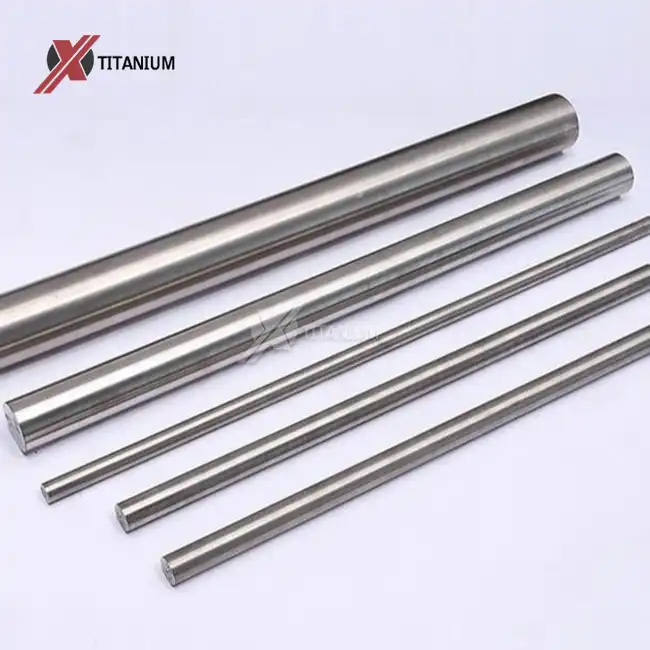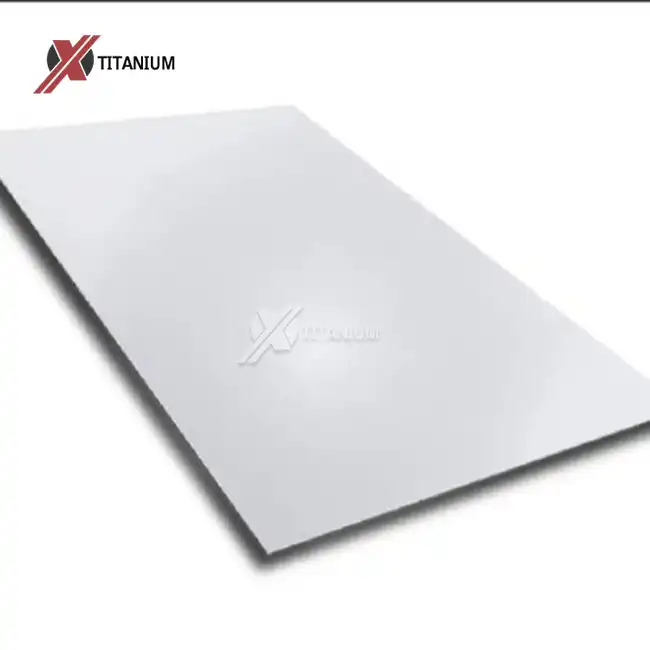Introducing Titanium's Atomic Structure
The secret to titanium's corrosion resistance lies in its atomic structure and chemical behavior. Titanium is a transition metal with an incomplete d-subshell in its electronic configuration. This unique characteristic allows titanium atoms to form strong, stable bonds with oxygen atoms in the presence of air or water.
When exposed to oxygen, titanium rapidly forms a thin, adherent oxide layer on its surface. This layer, primarily composed of titanium dioxide (TiO2), is merely a few nanometers thick but provides an impenetrable barrier against corrosive substances. The oxide film is self-healing, meaning that if it's scratched or damaged, it will quickly reform in the presence of oxygen or water.
The Passivation Process
The formation of this protective oxide layer is known as passivation. In grade 2 titanium rods, the passivation process occurs spontaneously and continuously, ensuring long-lasting protection against corrosion. This passive film is stable over a wide pH range, making grade 2 titanium rods resistant to both acidic and alkaline environments.
The passivation process in titanium is more effective than in many other metals due to the strong affinity between titanium and oxygen. The resulting oxide layer is tightly bonded to the underlying metal, preventing further oxidation and protecting the bulk material from corrosive attack.
Electrochemical Properties of Grade 2 Titanium Rods
The corrosion resistance of grade 2 titanium rods can also be understood through their electrochemical properties. Titanium has a high standard electrode potential, which means it's less likely to give up electrons and undergo oxidation compared to many other metals.
In electrochemical terms, titanium exhibits a wide range of passivity. This means that even in highly oxidizing environments, the protective oxide layer remains stable, preventing further corrosion. This property makes grade 2 titanium rods particularly suitable for use in seawater and other chloride-containing environments, where many other metals would quickly degrade.
Galvanic Corrosion Resistance
Grade 2 titanium rods also exhibit excellent resistance to galvanic corrosion. When two dissimilar metals are in electrical contact in the presence of an electrolyte, galvanic corrosion can occur, with the less noble metal corroding preferentially. Titanium's nobility in the galvanic series means it's less likely to corrode when coupled with other metals, making it an ideal choice for mixed-metal assemblies in corrosive environments.
Factors Influencing Corrosion Resistance in Grade 2 Titanium Rods
While grade 2 titanium rods are inherently corrosion-resistant, several factors can influence their performance in different environments:
Temperature Effects
The corrosion resistance of grade 2 titanium rods can be affected by temperature. At elevated temperatures, the protective oxide layer may grow thicker, potentially leading to embrittlement. However, in most applications, grade 2 titanium rods maintain excellent corrosion resistance up to moderately high temperatures.
Surface Condition
The surface condition of grade 2 titanium rods can impact their corrosion resistance. Smooth, polished surfaces generally offer better corrosion resistance than rough surfaces, as they provide fewer sites for corrosion initiation. Various surface treatments, such as pickling or passivation, can enhance the natural corrosion resistance of grade 2 titanium rods.
Environmental Factors
While grade 2 titanium rods are resistant to most environments, certain conditions can challenge their corrosion resistance. For instance, hot concentrated reducing acids or anhydrous methanol can cause corrosion. Understanding the specific environmental conditions is crucial for selecting the appropriate grade of titanium for a given application.
Applications Leveraging Grade 2 Titanium Rod's Corrosion Resistance
The exceptional corrosion resistance of grade 2 titanium rods has led to their widespread use in various industries:
Marine Applications
In marine environments, grade 2 titanium rods are used for components exposed to seawater, such as heat exchangers, pumps, and propeller shafts. Their resistance to saltwater corrosion makes them an ideal choice for long-term marine installations.
Chemical Processing
The chemical processing industry utilizes grade 2 titanium rods in reactors, piping systems, and storage tanks. Their ability to withstand a wide range of chemicals, including chlorine and other aggressive substances, makes them invaluable in this sector.
Aerospace
In aerospace applications, the corrosion resistance of grade 2 titanium rods is combined with their high strength-to-weight ratio. They are used in structural components, fasteners, and hydraulic systems where exposure to corrosive fluids is a concern.
Medical Implants
The biocompatibility and corrosion resistance of grade 2 titanium rods make them an excellent choice for medical implants. They resist corrosion from bodily fluids and tissues, ensuring long-term stability in the human body.
Advancements in Corrosion Resistance of Grade 2 Titanium Rods
While grade 2 titanium rods already offer excellent corrosion resistance, ongoing research and development are focused on further enhancing this property:
Surface Modifications
Advanced surface modification techniques, such as ion implantation or plasma electrolytic oxidation, are being explored to create even more corrosion-resistant surfaces on grade 2 titanium rods. These treatments can alter the surface chemistry and structure, providing enhanced protection in extreme environments.
Alloy Development
Researchers are continually developing new titanium alloys that build upon the corrosion resistance of grade 2 titanium while offering improved mechanical properties. These advancements aim to expand the application range of titanium in corrosive environments.
Nanostructured Coatings
Nanostructured coatings are being investigated as a means to further enhance the corrosion resistance of grade 2 titanium rods. These ultra-thin coatings can provide an additional barrier against corrosive species while maintaining the inherent properties of the titanium substrate.
Conclusion
The science behind titanium's corrosion resistance is a testament to the remarkable properties of this element. Grade 2 titanium rods, with their spontaneous formation of a protective oxide layer, electrochemical nobility, and resistance to various corrosive environments, have proven to be invaluable in numerous applications. As research continues to push the boundaries of corrosion resistance, grade 2 titanium rods are poised to play an even more significant role in addressing the challenges of corrosive environments across industries. Their unique combination of corrosion resistance, strength, and lightweight properties ensures that grade 2 titanium rods will remain at the forefront of materials science for years to come.
At Baoji Chuanglian New Metal Material Co., Ltd., we pride ourselves on being at the cutting edge of titanium manufacturing. Our grade 2 titanium rods are produced using advanced techniques to ensure optimal corrosion resistance and performance. Whether you're in the aerospace, marine, or chemical processing industry, our expert team is ready to assist you in finding the perfect titanium solution for your needs.
Frequently Asked Questions
What makes grade 2 titanium rods particularly corrosion-resistant?
Grade 2 titanium rods form a stable, self-healing oxide layer that protects against corrosive environments.
Can grade 2 titanium rods be used in seawater applications?
Yes, they are excellent for marine environments due to their resistance to saltwater corrosion.
How does the corrosion resistance of grade 2 titanium compare to stainless steel?
Grade 2 titanium generally offers superior corrosion resistance, especially in chloride-containing environments.
Are there any environments where grade 2 titanium rods should not be used?
While highly resistant, they may not be suitable for hot concentrated reducing acids or anhydrous methanol.
How can I obtain high-quality grade 2 titanium rods for my project?
Contact Baoji Chuanglian New Metal Material Co., Ltd. at info@cltifastener.com for expert guidance and top-quality products.
Experience the Baoji Chuanglian Advantage in Titanium Manufacturing
As a leading grade 2 titanium rod supplier, Baoji Chuanglian New Metal Material Co., Ltd. combines cutting-edge manufacturing techniques with decades of expertise. Our factory utilizes advanced processes like cold rolling, hot rolling, and precision annealing to produce titanium rods of unparalleled quality. We offer various surface finishes, including bright, polished, and sandblasted, to meet diverse industry needs. Our rigorous quality control, including hardness and hydrostatic testing, ensures that every rod meets the highest standards. For superior grade 2 titanium rods backed by industry-leading knowledge, contact us at info@cltifastener.com or djy6580@aliyun.com.
References
1. Smith, J. R. (2019). "Titanium Corrosion Science: A Comprehensive Review." Journal of Materials Engineering and Performance, 28(4), 2181-2191.
2. Chen, Q., & Thouas, G. A. (2015). "Metallic implant biomaterials." Materials Science and Engineering: R: Reports, 87, 1-57.
3. Oshida, Y. (2013). "Bioscience and Bioengineering of Titanium Materials." Elsevier Science.
4. Schutz, R. W., & Thomas, D. E. (1987). "Corrosion of Titanium and Titanium Alloys." ASM Handbook, 13, 669-706.
5. Peters, M., Kumpfert, J., Ward, C. H., & Leyens, C. (2003). "Titanium Alloys for Aerospace Applications." Advanced Engineering Materials, 5(6), 419-427.
